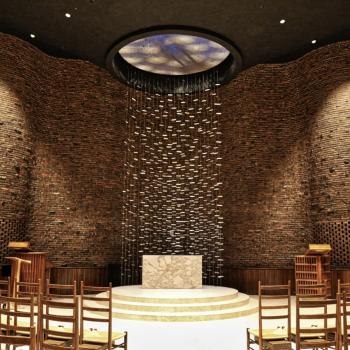Doom. Darkness. Tyranny. Misery. Ransom. Exile. Gloomy clouds. Dark shadows. The grave. Hell. Satan. All are words that appear in the great Advent carol O Come, O Come Emmanuel.
If you are looking for a song to get you ready for Christmas, you can’t do much better than the 12th-century Latin hymn “Veni, Veni Emmanuel”, known to most of us in the 1851 English version by J.M. Neale (who also wrote “Good King Wenceslas”, by the way.)
It’s dark. Heavy metal dark. Rachmaninov dark. But just like a great metal song – or a Romantic tone poem, for that matter – this Advent carol balances its gloom and doom with a powerful yearning toward the light.
Each stanza of the hymn moves from the shadows into the sun, daring to imagine the possibility of salvation that draws nearer with each passing day. Each is a desperate prayer for redemption, asking in turn for Israel to be ransomed, for its people to be saved from the grave, for death’s shadows to be erased, and for our dangerous path to be made safe. Again and again, the text swings back and forth between doom and deliverance, reminding us of the darkness – and the light – every step of the way.
THE ANCIENT WORDS
O come, O come, Emmanuel,
And ransom captive Israel,
That mourns in lonely exile here,
Until the Son of God appear.
Rejoice! Rejoice! Emmanuel
Shall come to thee, O Israel.
O come, Thou Rod of Jesse, free
Thine own from Satan’s tyranny;
From depths of hell Thy people save,
And give them victory o’er the grave.
Rejoice! Rejoice! Emmanuel
Shall come to thee, O Israel.
O come, Thou Dayspring, from on high,
And cheer us by Thy drawing nigh;
Disperse the gloomy clouds of night,
And death’s dark shadows put to flight.
Rejoice! Rejoice! Emmanuel
Shall come to thee, O Israel.
O come, Thou Key of David, come
And open wide our heav’nly home;
Make safe the way that leads on high,
And close the path to misery.
Rejoice! Rejoice! Emmanuel
Shall come to thee, O Israel.
O come, Adonai, Lord of might,
Who to Thy tribes, on Sinai’s height,
In ancient times didst give the law
In cloud and majesty and awe.
Rejoice! Rejoice! Emmanuel
Shall come to thee, O Israel.
THE MUSIC
We normally sing the hymn to an ancient chant melody. It’s a modal tune whose lowered seventh scale-degree (which we sing on the syllable “ra” of “Israel”) drops the mood from dark gray to midnight black. Yet, that same lowered seventh, when it appears in the refrain (“Rejoice”) is also what moves the song briefly into the relative major key, giving us a momentary glimpse of the promise of redemption. As in the Christian life, here the path to the light is through the darkness:
For one who has died has been set free from sin. Now if we have died with Christ, we believe that we will also live with him. – Romans 6:7-8
Of course, since this is Advent, the tune quickly returns to the original minor mode at the end of each stanza. “Emmanuel” is still a mystery, shrouded in darkness. In Advent, Jesus is not yet a baby boy, and he’s certainly not a Redeemer. He is but an idea, a promise: “God-with-us” – whatever that may be.
NEW MUSIC FOR AN ANCIENT TEXT
In 2016 I was commissioned by Genesis Chamber Singers to write a new Advent carol for their December concert. I chose to set to music a selection of stanzas of this great hymn. Written for unaccompanied choir, the piece – which sets the text to brand-new music – creates a dark and even eerie sonic landscape that reflects the Medieval mind from which it emerged. My goal was to capture the darkness and mystery of this foreboding text, honoring the remarkable testimony of a people who keenly felt the gravity of their sins – and the ever-present possibility of damnation.
While I do not personally subscribe to the theology of atonement so palpable in this text, I think that its message is important one for us modern Christians to hear at the beginning of the season of Advent. For centuries we have been guilty ignoring the poor, destroying the earth, and waging war on our brethren – all in the name of God. But Advent is a time of re-beginning, a time when we allow the darkness of the season to prepare our hearts for the birth of Jesus: our source of light, hope, and redemption.


















